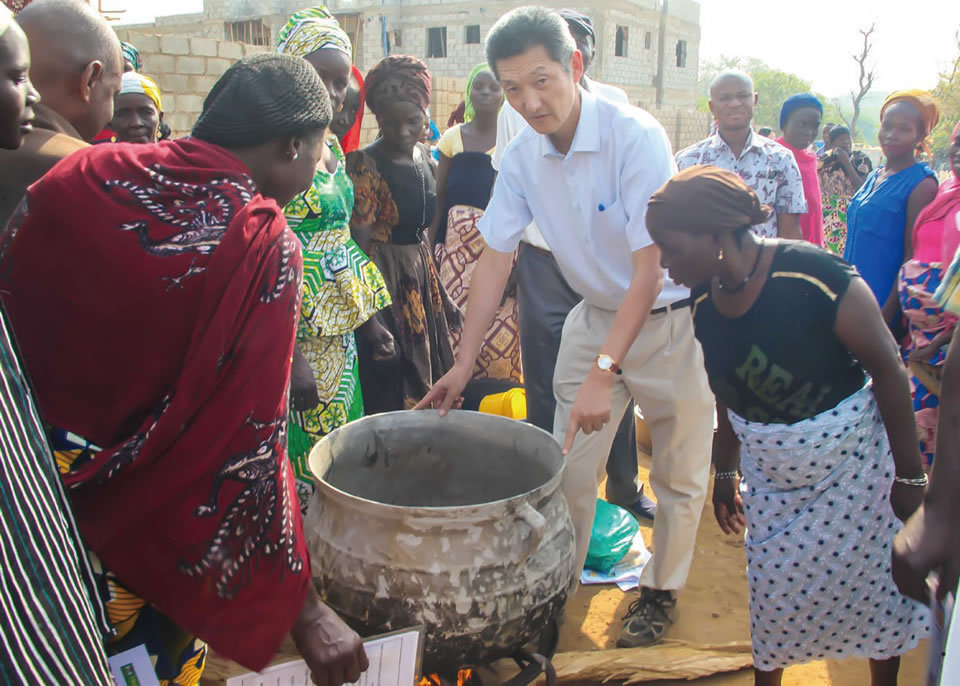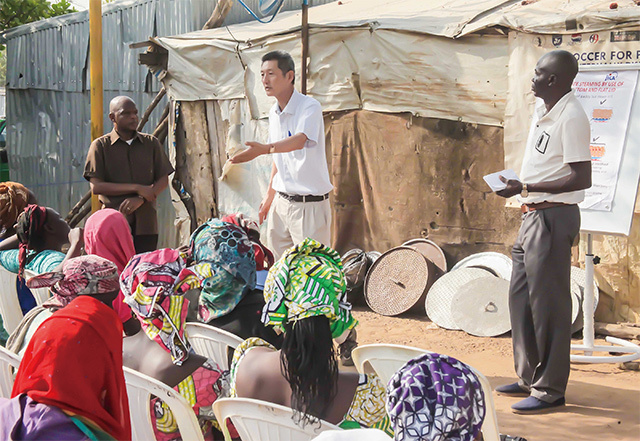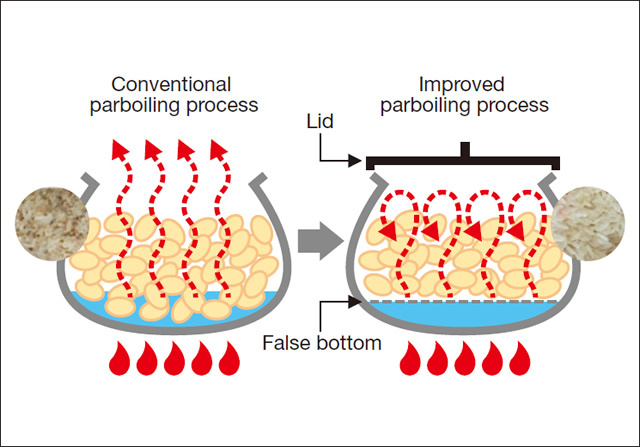For many African countries, national development relates directly to agricultural development. The present insufficiency of institutions and personnel offering technical expertise in agriculture, however, hinders improvements in agricultural productivity, forcing countries to depend on imports of foreign foodstuffs.
Japan has long dispatched expert personnel to provide support for African agriculture. When the Sixth Tokyo International Conference on African Development (TICAD VI) was held in August 2016, many African heads of state asked for an expansion of this support. Japan has responded by creating a new platform to connect Japan and African nations. While continuing to dispatch specialists to share their agricultural expertise and educate locals, Japan will also boost efforts to create effective Official Development Assistance (ODA) projects related to agricultural cooperation.
The Government of Japan, after considering the requests from national leaders at summit meetings and determining specific needs, recently dispatched Japanese agricultural expert Hiroshi Kodama to Senegal and Guinea. Kodama, who has a wide range of experience in his field, explains the approach as follows. “In agriculture, just as in providing any kind of support, things won’t go well if you force your technology upon people. Before introducing new technology, it’s so important to match innovative, adaptive solutions with the needs of the people. This is what we mean by the term ‘appropriate technology’: responding to people’s needs in ways that make sense technologically and economically for those particular people.”
Japanese Individuals Contributing Worldwide
An Expert’s Touch Improves
African Farmers’ Lives
Hiroshi Kodama
Worked with the Ministry of Agriculture, Forestry and Fisheries in Japan on rural development and promotion of agriculture, food-related technology development support, and the analysis and improvement of the value chain of flowers. He worked on a United Nations Food and Agriculture Organization project in countries in south-east and south Asia and served with the Japan International Cooperation Agency (JICA) in the Philippines and Nigeria. Currently, he is working with JICA in Senegal and Guinea.
Kodama in Nigeria explaining the process of parboiling with false bottoms. JICA is partnering with the World Bank, the International Fund for Agricultural Development, the German Corporation for International Cooperation (GIZ), and other institutions to spread the process throughout Nigeria. As of January 2018, 23,607 persons have been trained in the new process and 14,216 have adopted it.
Parboiling process
In the conventional process, rice near the bottom gets boiled, but heat doesn’t adequately reach the rice at the top. Inserting a perforated false bottom separates the rice and water, allowing the boiling water to steam the rice. Adding a lid prevents the steam from escaping, forcing it to circulate and cook the rice evenly.
Kodama hopes “not only to spread the false-bottom technique, but match innovative, adaptive solutions with the needs of people in Senegal and Guinea. To do this, I first want to get a clear picture of the people’s situation with my own eyes and ears and figure out what they need.”
Kodama, who grew up in a city, has strong sentiments about agriculture. “As a child, I realized that for me to enjoy urban life, I depended on the strenuous labors of farmers that provided my food. Out of a feeling of indebtedness to these farmers, I decided in high school that I wanted to pursue a career that involved doing something useful for them.”
This led Kodama to major in agriculture in university, where he studied agricultural chemistry. He then went on to do specialized research on soil and plant nutrition in graduate school. Kodama’s thought when he learned in university about the plight of farmers in developing countries was “I wish I could help make their lives better.” He joined the Ministry of Agriculture, Forestry and Fisheries after graduation, and has since been working for agricultural development in Japan. Doors also opened for Kodama to contribute his expertise in Asia and Africa. Recently, he has been involved in a project teaching rice-processing techniques in Nigeria.
Much of the world’s paddy rice is processed by parboiling, a method of cooking in which hot water and steam force nutrients in the rice bran back into the rice kernel. Parboiled rice can also be milled efficiently and with less breakage than non-parboiled rice. In Nigeria and elsewhere in West Africa, however, the parboiling process wasn’t performed optimally and the quality of the milled rice varied greatly. Kodama worked to solve this problem. He encouraged Nigerians to adopt a parboiling technology that uses a perforated “false bottom” (see diagram). This increases the rice’s quality and allows it to be traded at a price 10% to 20% higher than conventional rice. Kodama explains, “In rural districts, farmers’ wives are often tasked with the parboiling process. After beginning to use the false bottom, their income has risen and I’ve heard some of them tell me ‘now I can pay my children’s school-related fees’ or ‘I can buy lots of beans and eggs now.’”
Such reports bring a smile to Kodama, encouraging the grateful city boy turned farmers’ friend in his mission to discover, develop, and spread the use of appropriate, life-changing technology so that it can bring smiles to the people of Senegal and Guinea as well.

































